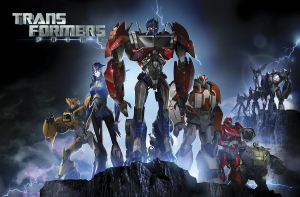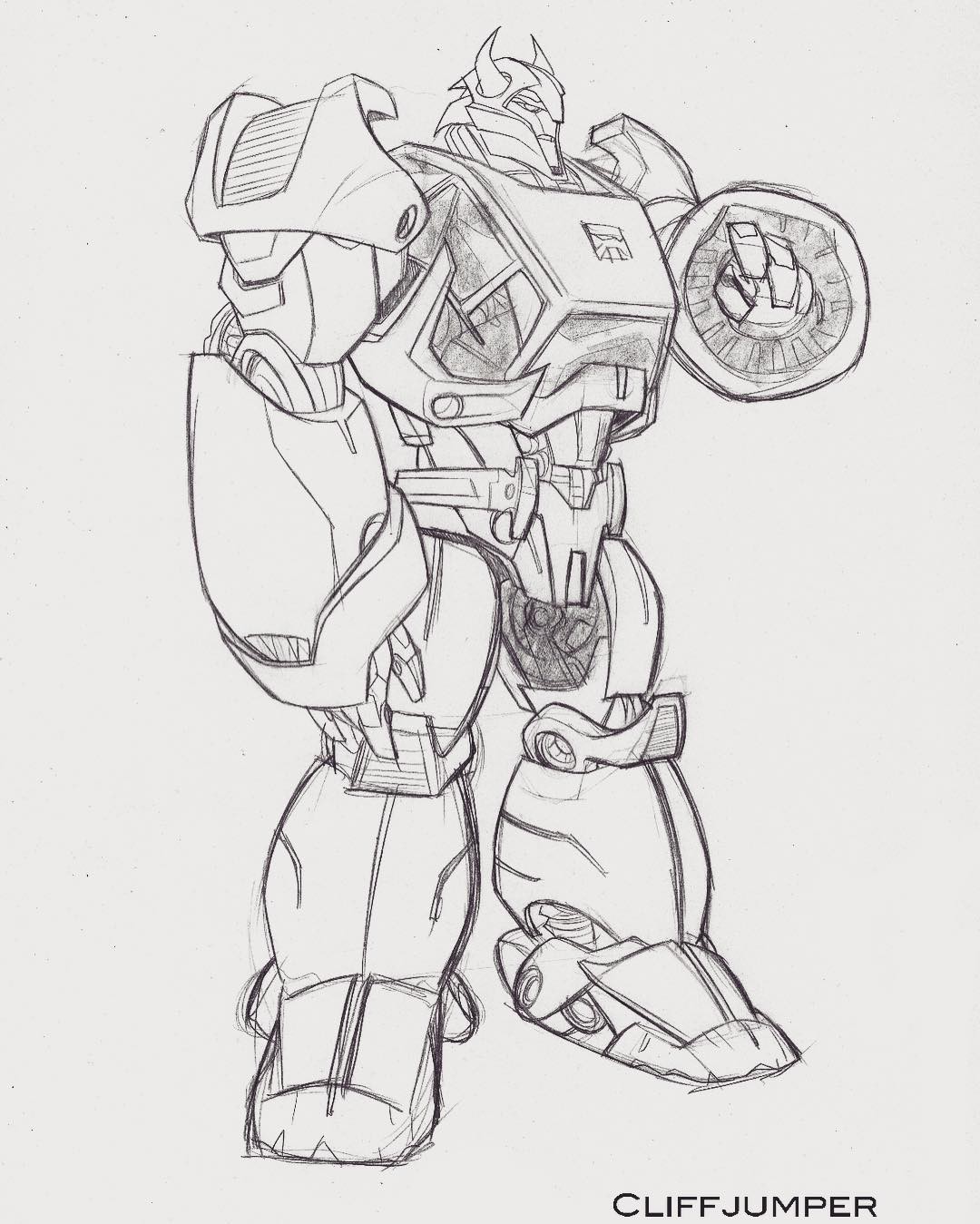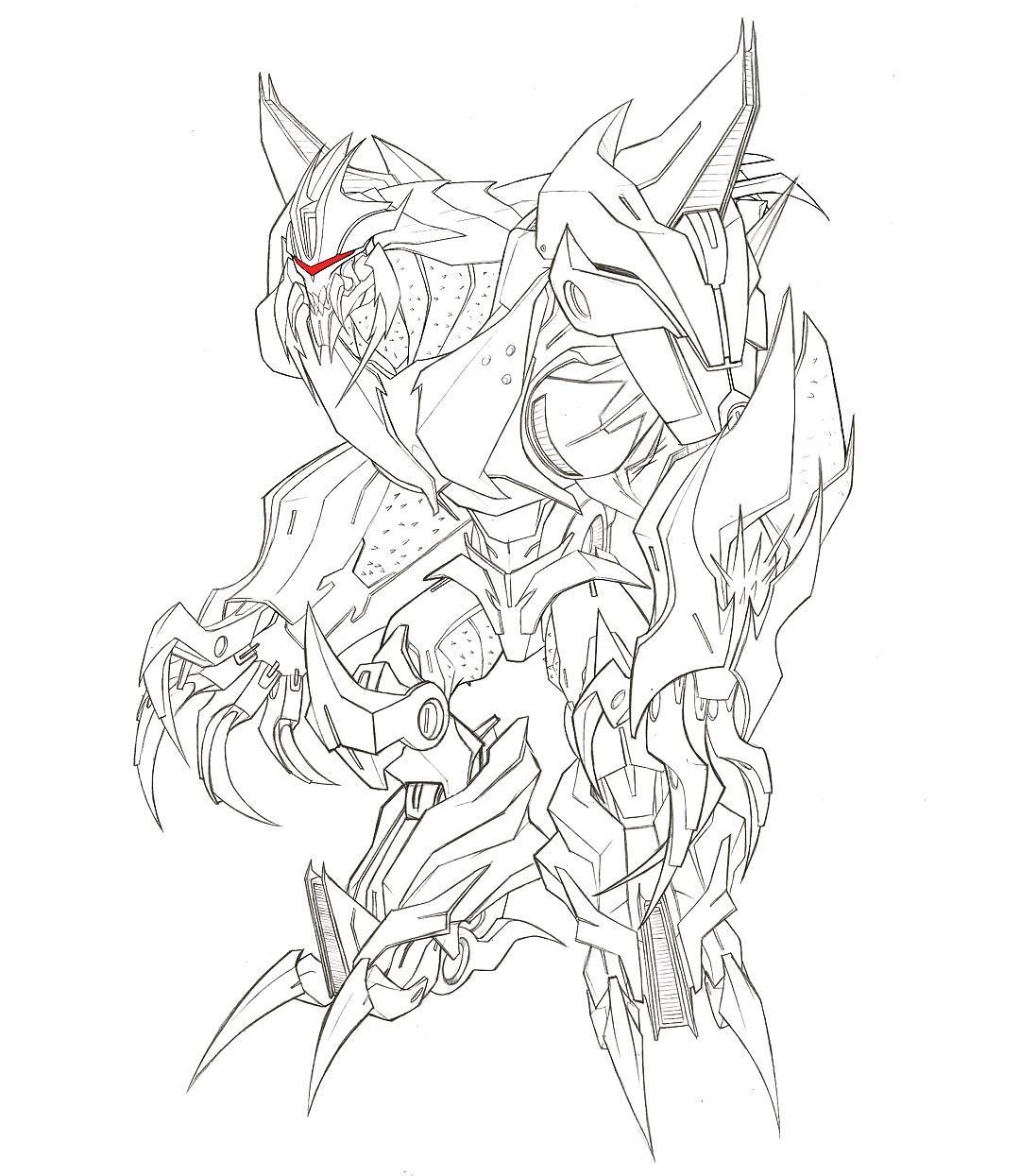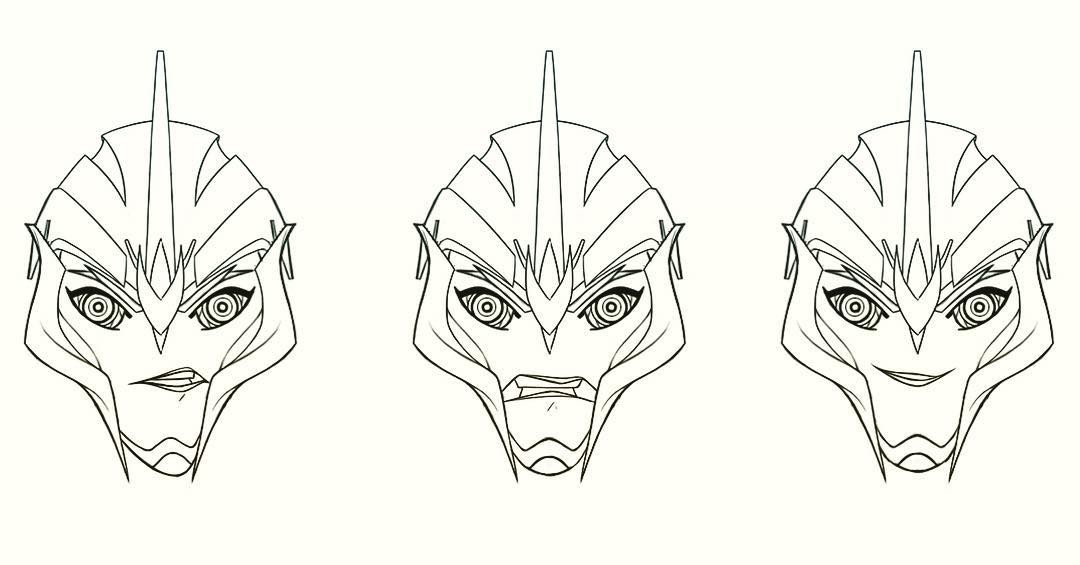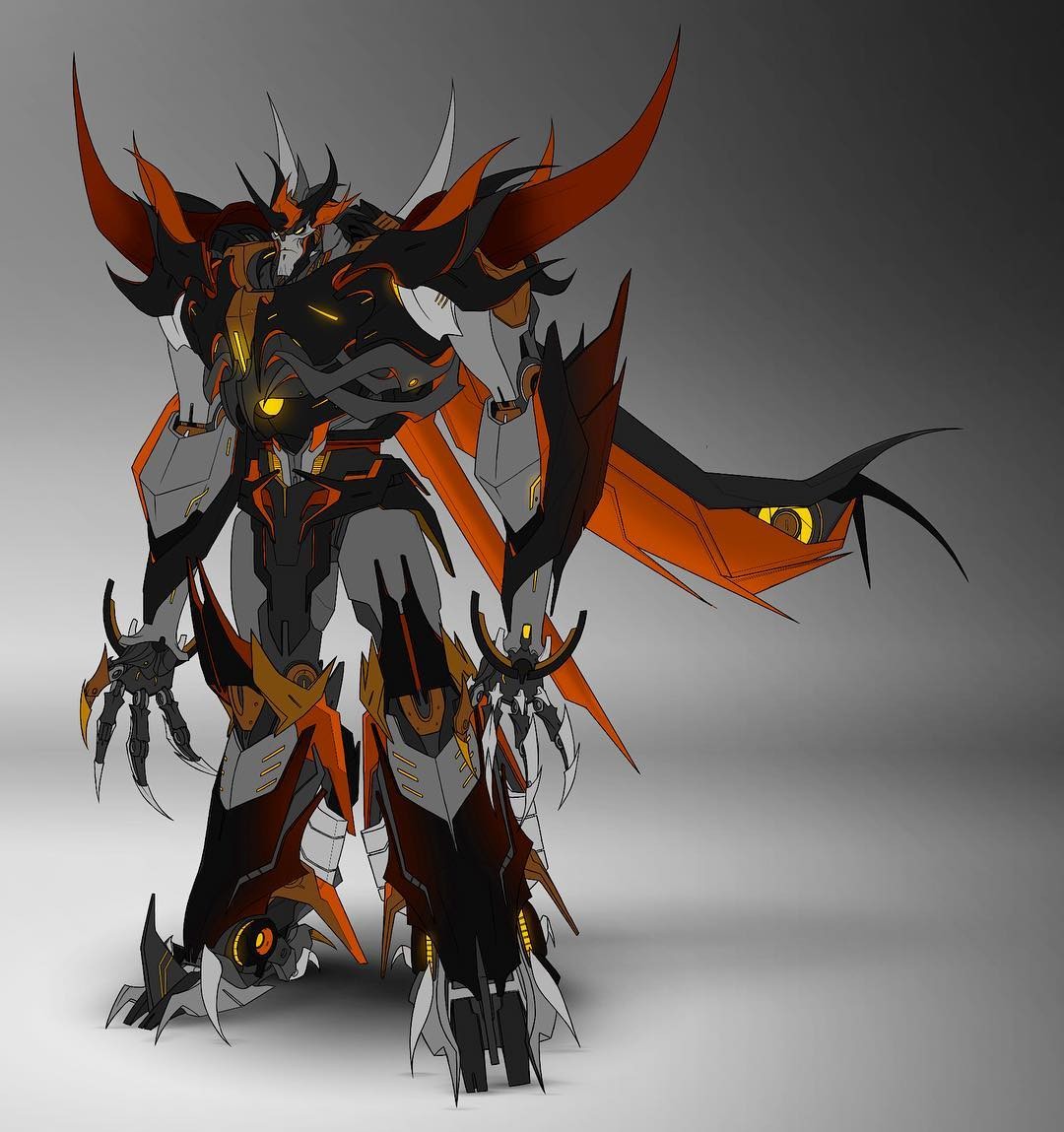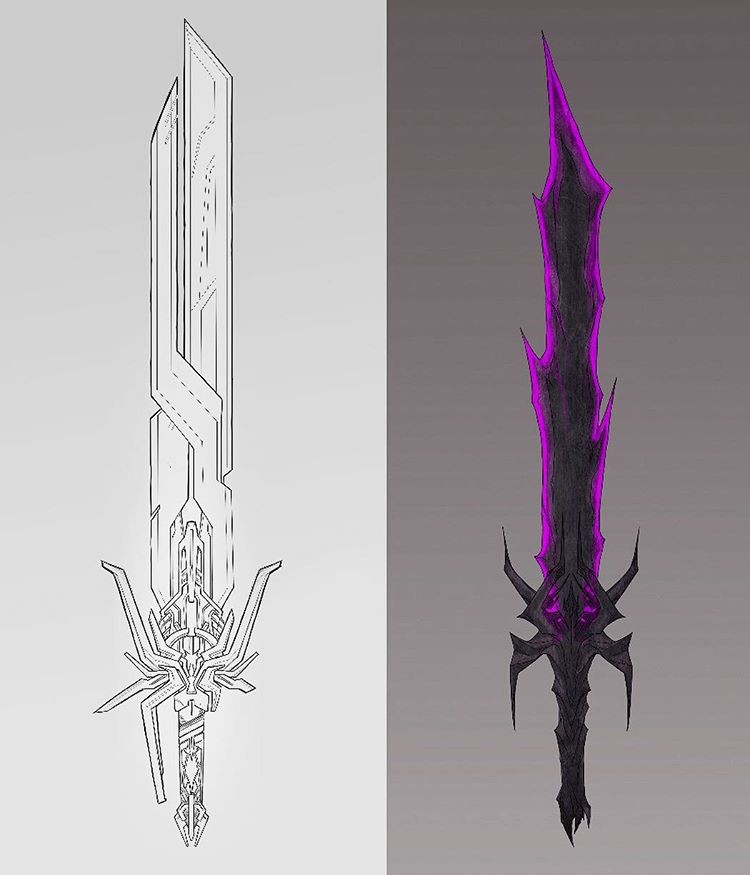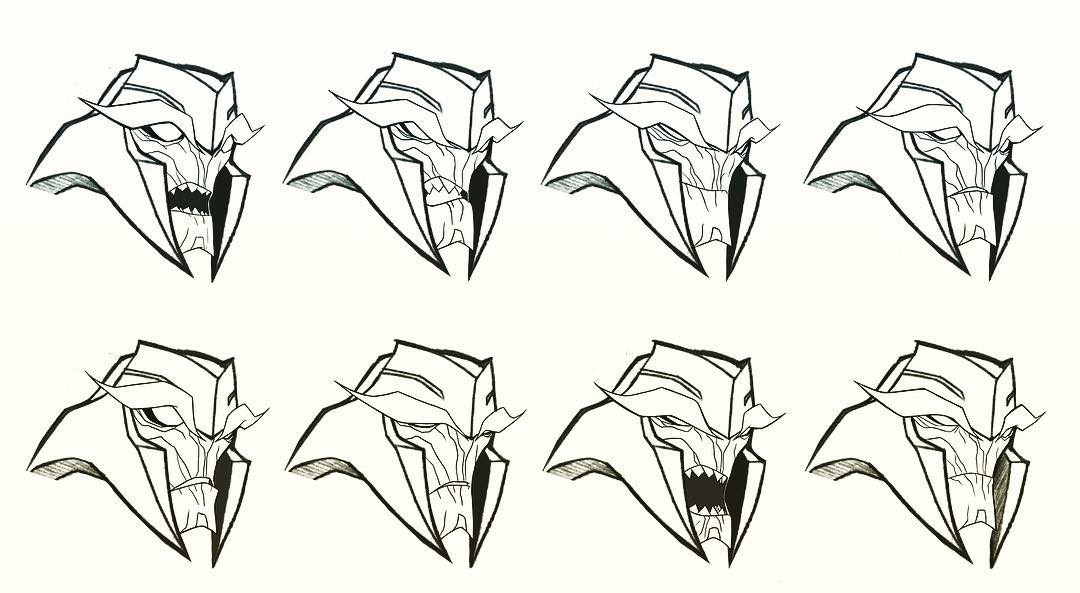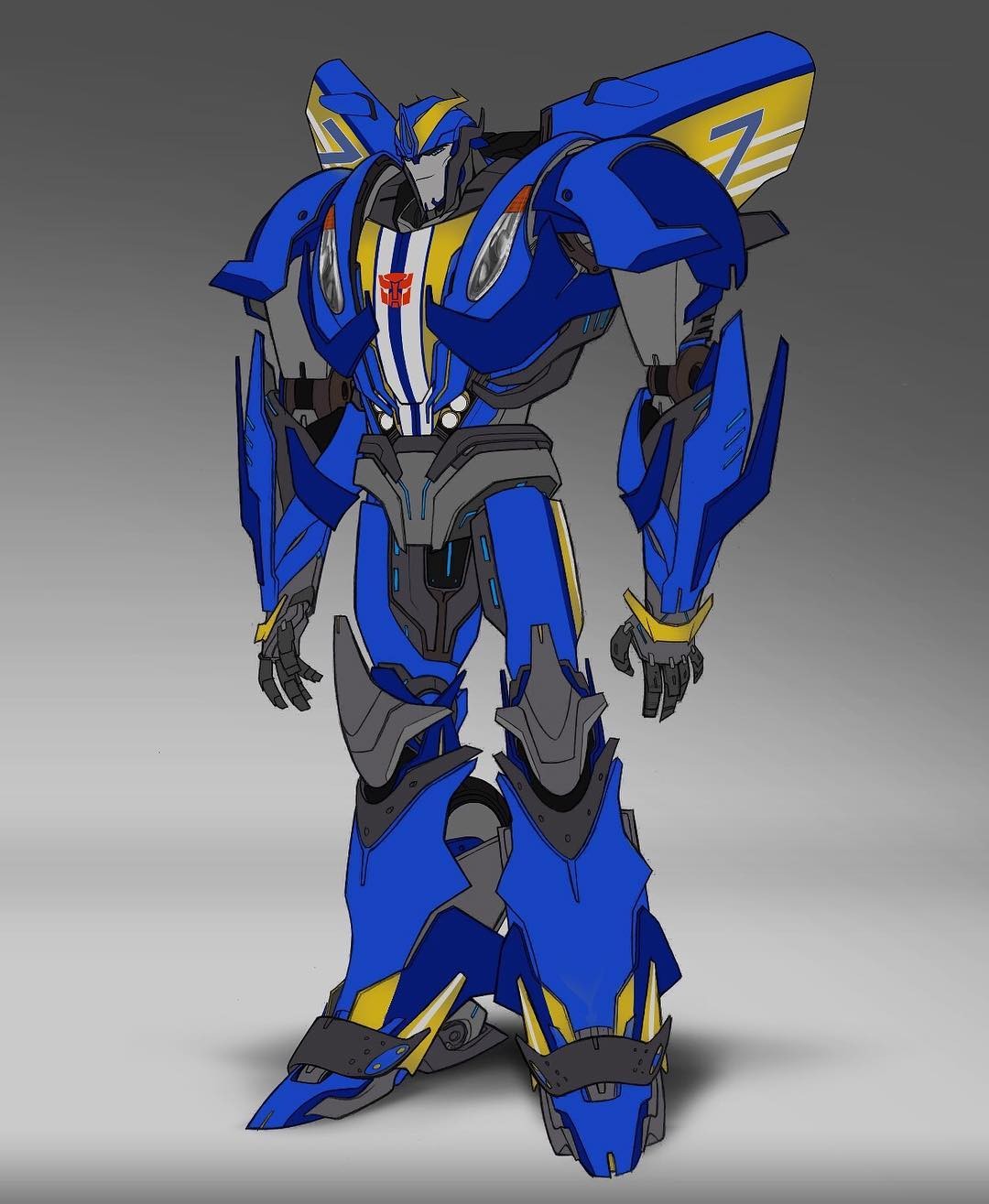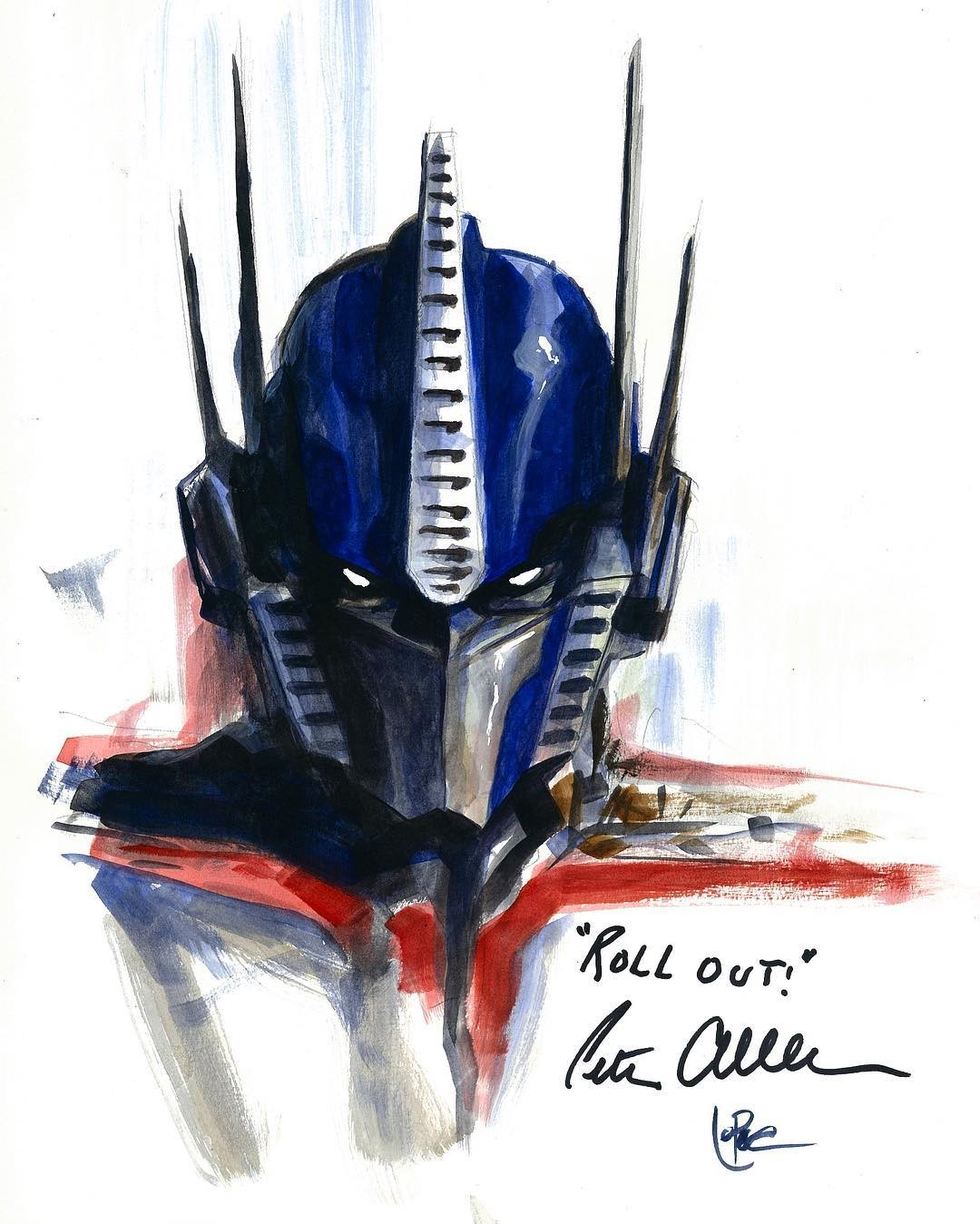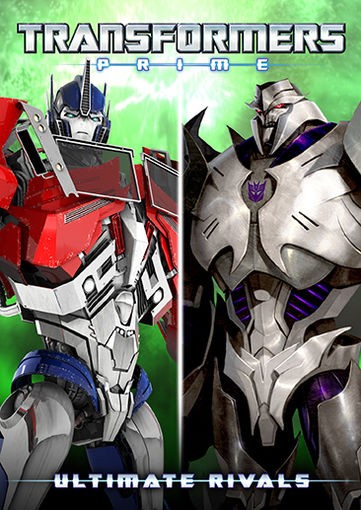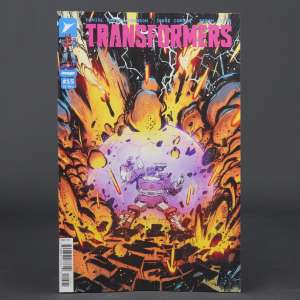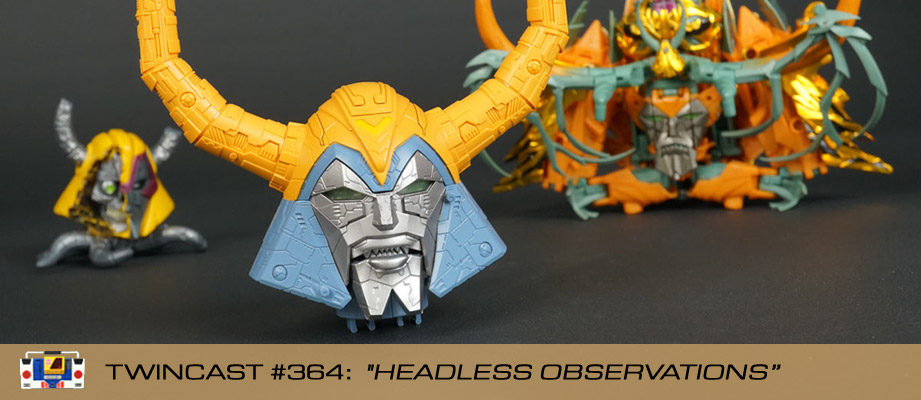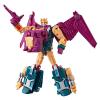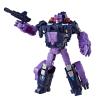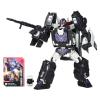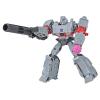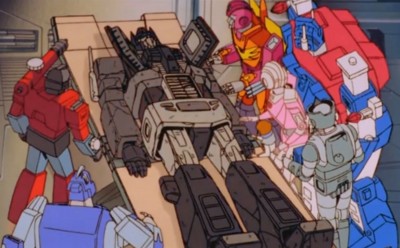Transformers: Prime Blu-Ray Box Set Listing
Monday, June 27th, 2016 8:24AM CDT
Categories: Cartoon News, Digital Media NewsPosted by: Va'al Views: 28,711
Topic Options: View Discussion · Sign in or Join to reply
This page may contain affiliate links. We may earn commissions when readers interact with or purchase items through these links. For more information, see our affiliate disclosures here.
It's been over a year since the last big news for the animated series Transformers: Prime, but we now have a nudge from online retailer Amazon.com, in the form of a Blu-Ray box set of the complete series run! You can check out the listing at $144.99 here, and more details below, though no images are yet available. Will you be getting this or relying on the Netflix version? Let us know your thoughts in the Energon Pub!
Format: Box set, Import
Studio: Imports
DVD Release Date: August 12, 2016
ASIN: B01HJRMTZA
News Search
Got Transformers News? Let us know here!
Most Popular Transformers News
ROTB Optimus Prime Lead Designer Discusses Why the Face Looks Similar to the 2007 Movie
58,076 viewsMost Recent Transformers News
Posted by Sabrblade on June 27th, 2016 @ 9:10am CDT
Posted by Rodimus Knight on June 27th, 2016 @ 9:50am CDT
Posted by Sabrblade on June 27th, 2016 @ 9:52am CDT
Maybe the packaging is special or something.Rodimus Knight wrote:This seems awfully expensive for the complete series in this case.
Posted by o.supreme on June 27th, 2016 @ 10:46am CDT
Even at full prime right now on Amazon:
Blu Ray S1=40, S2=40, S3= $16, PR=14 Total: $110.00, better than the MSRP for this set, though likely upon release, this set will be closer to $100, so who knows....But I cant imagine what sort of extras would warrant a double-dip, I'm perfectly happy with what I have.
What I would like to see from S!F
Scramble City (*hopefully on the TFTM 30th anniversary release*)
Zone
Full Series sets:
Beast Wars II
Beast Wars Neo
Car Robots/RiD (If S!F can negotiate with Saban to get Power Rangers, they can surely get this...)
Transformers GO!
Rescue Bots Season Sets
Posted by Sabrblade on June 27th, 2016 @ 10:50am CDT
Except Saban doesn't have RiD. Disney bought it from Saban, Saban didn't buy it back, so now it's in Disney's ownership limbo.o.supreme wrote:Car Robots/RiD (If S!F can negotiate with Saban to get Power Rangers, they can surely get this...)
Posted by o.supreme on June 27th, 2016 @ 10:55am CDT
Posted by Sabrblade on June 27th, 2016 @ 10:56am CDT
Saban bought all of Power Rangers back from Disney (including the Disney Era seasons), but not RiD.o.supreme wrote:But didn't Disney own the Saban portion of Power Rangers as well?...I just thought there was some way they could work it out. If not then I'll stick with the Malay RiD set I have, but it would just be nice to have a North American release.
Posted by o.supreme on June 27th, 2016 @ 11:00am CDT
Posted by Sabrblade on June 27th, 2016 @ 11:10am CDT
Yeah, the shows Saban bought back from Disney were Digimon, Power Rangers, Masked Rider, Beetleborgs, VR Troopers, Mystic Knights, TMNT: The Next Mutation, and (according to Wikipedia, so take it with a grain of salt) Shinzo. But RiD remains in Disney's limbo.o.supreme wrote:Wow that is too bad...Strange...I assume Saban bought back most if not all of their live-action series stuff based on sentai? Now Disney has this thing they have absolutely no interest in promoting, perhaps they don't even realize they have. Hopefully in time however, kind of like TF:TM, Hasbro will actively try to get the rights back.
Posted by Va'al on December 13th, 2016 @ 4:04am CST
Posted by ToaLeePrime on December 13th, 2016 @ 4:37am CST
 I'd love to have that framed on my wall!
I'd love to have that framed on my wall!Posted by Silverwing on December 13th, 2016 @ 8:28pm CST
ToaLeePrime wrote:Gosh, that water color of Prime is gorgeous!I'd love to have that framed on my wall!
Heartily seconded!
Posted by danielmelendez33 on December 16th, 2016 @ 4:29pm CST
The drawing of Jose Lopez seems to me an excellent work! Try to do the same drawing in microsoft paint!
My regards to Jose Lopez
Bye!
Posted by Kurona on March 9th, 2017 @ 6:58am CST
-Young, brash hotheaded kid appeal newcomer
-Despite this has a lot of skill and experience
-Hinted at becoming a Prime
He's basically the same character archetype without all the superficial qualities. I don't know what happened in production; maybe they really wanted to keep the name Smokescreen, maybe they didn't want to turn off people who hated Hot Rod from the 1986 movie, maybe they literally made an original character and it just -happened- to be what an aligned version of Hot Rod would be... I dunno. This dude's Hot Rod to me.
Posted by Sabrblade on March 9th, 2017 @ 9:27am CST
And Cheetor. And Side Burn. And Wedge. And Hot Shot. Etc. etc.Kurona wrote:So is it just me, or is Smokescreen basically Hot Rod?
Well, let's also not forget that, at the time, Hasbro didn't yet have the name "Hot Rod" back like they do now, hence all the Hot Rod toys of the time being called "Rodimus".Kurona wrote:He's basically the same character archetype without all the superficial qualities. I don't know what happened in production; maybe they really wanted to keep the name Smokescreen, maybe they didn't want to turn off people who hated Hot Rod from the 1986 movie, maybe they literally made an original character and it just -happened- to be what an aligned version of Hot Rod would be... I dunno. This dude's Hot Rod to me.
Though, if one were to consider the rest of the Aligned media from back then (which was when the old Hasbro brand team was still around and pushing for people to acknowledge the games, books, and comics as well as the cartoons), there already was this guy from the War for Cybertron games:

This guy was obviously meant to be the Hot Rod of the games, but since Hasbro didn't have that name back yet, the games called him "Hot Shot" instead. Why they did this instead of calling him "Rodimus" is because, according to Aaron Archer at the BotCon 2010 Activision panel, the name "Rodimus" didn't fit with the story of the games and, at the time, Hasbro was wanting to tell the story of how the character would become "Rodimus" (alas, they never got to tell this story before the old team was switched out the current team).
Though, the unofficial short story "Bumblebee at Tyger Pax" (written by Alex Irvine, author of the Exodus and Exiles novels) did feature the character during the WFC era already bearing the name "Rodimus", but that the story was unofficial. However, the Retribution novel, which was official, did also feature the guy going by the "Rodimus" name, so he did at least exist with that name at that point.
Anyway, the point I'm trying to get to with all this WFC Rodimus talk is that, since the old Hasbro team was trying to push for every piece of Aligned media to go together, maybe they requested the show to not use Rodimus for the new young Autobot character in the show due to his already having been in the games and because of his then-upcoming role in a novel that would place him on Optimus's team in the ancient past.
Although, according to the Prime season 1 DVD/Blu-Ray audio commentaries, Smokescreen, rather than Cliffjumper, was originally going to have been the Autobot who died in season 1, and his death would have been in the finale instead of Episode 1. IMO, I think this was for the better because, while I still hated Cliffjumper's cheap death, Smokescreen got to live and become awesome for it. He's the best Autobot character in the show, just for his being the sole Autobot on the main team who actually enjoys what he does (Wheeljack does too, but it took him forever to become part of the main cast instead just a guest star).
Posted by PrymeStriker on March 9th, 2017 @ 3:50pm CST
Posted by o.supreme on March 9th, 2017 @ 4:03pm CST
PrymeStriker wrote:In the end, he learns that his real place is to be just a good cog in the Autobot machine. It actually sets his arc apart from Rodimus for me because he didn't just achieve Prime status in the end, rather, he realized that he's not entitled to become the greatest thing since..
That's one of the things I really enjoyed about Smokescreen's character. He learned humility, at least to a degree. I still recall the line from Predacons Rising about asking "who made him leader" referring to BB with just a slight touch of resentment.
But all that aside, I myself am a bit taken back, as I've heard comments from some that assert that the writers were pandering to "geewun fans" who hated Hot Rod/Rodimus and making Smokescreens outcome the way "they always wanted"
For the record, as a fan of the original series, I never hated Hot Rod or Rodimus Prime. Sure he wasn't as cool as Optimus IMHO, but I had no desire to see him die, or even be replaced. In my mind Optimus was gone forever, and I had to accept the change (prior to obviously adverts of TROOP in late 86/early 87).
The fact that Smokescreen's life didn't follow exactly the path he may have wanted, was what warmed me up to him by the end of the series. Also, since the aligned continuity is still going, who's to say Smokescreen wont achieve some great status in time? I'd love to see his current status revealed as well as the rest of the crew from TFP related at some point in RiD15, whether that happens or not remains to be seen.
Posted by WreckerJack on March 21st, 2017 @ 2:13am CDT
Posted by o.supreme on March 21st, 2017 @ 9:30am CDT
TBH, I don't see younger people as lazy at all (well some are, but that can be said of anybody-middle-aged, older etc...) . One of my co-workers is 15 years younger than me, and is really good at what he does. The problem is, he does think a little too much of himself. Now not to toot my own horn, but I've NEVER been that prideful. To be fair though, I'm not going to use him as the label for all people his age, I know everyone is different. Whether he will humble with age or not remains to be seen.
With the case of the fictional character of Smokescreen in TFP however, I thought he did develop well over time. But honestly in looking back over the course of TFP, I can't say there was a single character I didn't like. Miko was probably closest -but seeing my daughter laugh at her antics endeared me to her somewhat, kind of like Sari in TFA. Had I not had kids, I would have hated both those characters simply based on their annoyance factor.
Posted by Sabrblade on March 21st, 2017 @ 9:36am CDT
Posted by Kurona on March 21st, 2017 @ 12:20pm CDT
Posted by Sabrblade on March 21st, 2017 @ 12:59pm CDT
He was okay, but still yet another stick-in-the-mud, which were a dime a dozen in this show.Kurona wrote:I personally liked Ultra Magnus the most,
Posted by o.supreme on March 21st, 2017 @ 1:16pm CDT
Sabrblade wrote:He was okay, but still yet another stick-in-the-mud, which were a dime a dozen in this show.Kurona wrote:I personally liked Ultra Magnus the most,
Sure, but some people's "stick-in-the-mud" are others consistent, reliable, strong, characters worthy of admiration/imitation. I really like Prime in this series (which I know is incomprehensible to some).
If I had to pick a *favorite* Autobot it would be tough...I like them all, for various reasons, which is why I think this show is exceptional. Usually in every other incarnation, there will be one or two characters that resonate with me, and all the others are *meh" to dislikable.
Even all the Decepticons are pretty cool. Probably the one I like the least is Airrachnid, but I don't dislike her...just like her the least. Probably my least-liked Autobot was BB simply because of the whole Movie "beeping" attribute. In the end when Will Friedle became his VA, his character improved tenfold simply by that fact alone IMHO.
With Rid15 it's been Really difficult to choose a favorite. I like the show well enough, but none of the characters really resonate, and Optimus really isn't enough of a presence. Sure I know he's there, but to me he just really isn't part of the show...I know that makes no sense when I write it in this forum, but in my head it does. I guess my favorite so-far is Drift, he encompasses some of the qualities I aspire to, but not 100%...I'm Hoping season 3 introduces some new characters that I can evaluate.
Posted by PrymeStriker on March 21st, 2017 @ 2:10pm CDT
I feel like the weakest Autobots in Prime were the same three Autobots that were weakest in Animated, and I can say that with more confidence now that I'm towards the end of rewatching the latter. Optimus, Bumblebee, and Bulkhead. I'll give Animated points for giving these three personalities, no matter how cliche, overdone, uninteresting, and lazy they are, but Prime didn't even really manage that. All three of them were very blank characters. Arcee joined them in season three, but thankfully she was an interesting enough in her own right during the first two seasons to warrant the accolades she receives. She and Ratchet were the only characters worth watching on the Autobots side until Smokescreen showed up, unless Wheeljack made one of his guest appearances.
All that said, however, what I liked about Prime was its ability to give both the Autobots and Decepticons an equal hand in being justified fan favorites, unlike Animated or even Beast Wars in some select cases. Dreadwing, Knock Out, and Starscream were all characters I loved to watch, and share equal footing as the best characters in Prime alongside Smokescreen, Wheeljack, Ratchet, and Magnus. With Dreadwing, while I didn't like how they abruptly killed him off, his arc still came full circle and had a powerful moral to tell. "Betraying my kind is not the same as accepting yours" is still a kickass quote, because it not only shows that Dreadwing had the kind of honor to feel disappointed in the Decepticons but still not forgive the Autobots for what they've done to him, but it also teaches people that you don't necessarily have to choose a side. You can tell both sides to f*ck off and abide by your own morality. Meanwhile, Starscream's survival arc is still easily one of the best storylines in the show and Knock Out was both hilarious and fun to have around. That doesn't even account for Soundwave, who was easily the most menacing incarnation of the namesake, and Shockwave perhaps solely for David Sobolov's performance. Megatron even got his moment of salvation at the end of Predacons Rising, which was delightfully unusual.
So, in summation, Prime Seaspray is the best Transformers character ever and is the ultimate waifu.
Posted by Kurona on March 21st, 2017 @ 3:45pm CDT
Sabrblade wrote:He was okay, but still yet another stick-in-the-mud, which were a dime a dozen in this show.Kurona wrote:I personally liked Ultra Magnus the most,
What was different about him for me compared to, say, Prime is that they actually kind of explored his character and you really felt how disconnected he felt for everyone; very much a fish out of water. It's a portrayal I rather enjoyed and connected with.
Posted by Sabrblade on March 21st, 2017 @ 4:17pm CDT
I can see that. Yeah, I'd say, of the stick-in-the-muds, he was one of, if the, best of them.Kurona wrote:Sabrblade wrote:He was okay, but still yet another stick-in-the-mud, which were a dime a dozen in this show.Kurona wrote:I personally liked Ultra Magnus the most,
What was different about him for me compared to, say, Prime is that they actually kind of explored his character and you really felt how disconnected he felt for everyone; very much a fish out of water. It's a portrayal I rather enjoyed and connected with.
Posted by WreckerJack on March 22nd, 2017 @ 12:41am CDT
Posted by Sabrblade on March 22nd, 2017 @ 10:07am CDT
Yeah, on the Autobots side, I think the only ones who don't change at all are the three that PrymeStriker mentioned: Optimus (barring his Orion Pax episodes that simply reverted every change made to him in that three-parter), Bumblebee (him suddenly gaining a personality when he gets his voice back at the end doesn't count since he barely had a personality to begin with), and Bulkhead.WreckerJack wrote:I think a lot of the characters really changed over the series too. Like Ratchet going from not being able to stand humans but by the end he wants to stay on Earth a little longer. Smokescreen stops being so impulsive and learns to think more. Arcee learns to open up to her teammates despite her fear of loss.
And for Optimus it's a shame too, since the Orion Pax episodes were when he was at his most interesting in the whole series, showing more sides to himself and his personality than he ever did as Optimus Prime.
Posted by WreckerJack on March 22nd, 2017 @ 8:47pm CDT
Sabrblade wrote:Yeah, on the Autobots side, I think the only ones who don't change at all are the three that PrymeStriker mentioned: Optimus (barring his Orion Pax episodes that simply reverted every change made to him in that three-parter), Bumblebee (him suddenly gaining a personality when he gets his voice back at the end doesn't count since he barely had a personality to begin with), and Bulkhead.WreckerJack wrote:I think a lot of the characters really changed over the series too. Like Ratchet going from not being able to stand humans but by the end he wants to stay on Earth a little longer. Smokescreen stops being so impulsive and learns to think more. Arcee learns to open up to her teammates despite her fear of loss.
And for Optimus it's a shame too, since the Orion Pax episodes were when he was at his most interesting in the whole series, showing more sides to himself and his personality than he ever did as Optimus Prime.
I want to say KnockOut changed a little. He seemed to get sadder and sadder. From the way Starscream treated him, losing Breakdown and having his scientific projects get taken over by Shockwave. I think that was the reason he left.
I really would like to have seen more of what was going on with him and what happened after he betrayed Starscream in the movie. I think he has good in him but isn't necessarily a hero. He's one of the few that "plays by his own rules" and I wish I knew what happened to him after Beast Hunters.
Posted by o.supreme on March 23rd, 2017 @ 10:08am CDT

Posted by Sabrblade on March 23rd, 2017 @ 10:27am CDT
His altmode CG model.o.supreme wrote:fan speculation/easter egg Knockout appearance in Rid15
Though, TF: Prime recycled that model a few times for other cars as well.
Posted by o.supreme on March 23rd, 2017 @ 11:00am CDT
There does seem to be some building story that the characters in TF Prime weren't exactly revered once Cybertron was repopulated and brought back to full thriving status. But in Decepticon Island when Ratchet was talking about those that "blamed" Prime for what happened previously rather then honoring him, you'd think Bumblebee (a law enforcement officer) would known about it, but he seemed to have no knowledge of this.
Then again Ratchet was sulking in a junkyard after the events of season 2, maybe knockout just decided to do the same thing sometime after Predacons Rising?
Posted by PrymeStriker on March 23rd, 2017 @ 11:45am CDT
Posted by Sabrblade on March 23rd, 2017 @ 11:49am CDT
Posted by Kurona on March 23rd, 2017 @ 1:05pm CDT
Posted by Sarahthecutevixen on May 9th, 2017 @ 12:58pm CDT
right before Jack Calls his mother you can see for one frame his phone background and it's of Arcee
took two photos in different size and brightness to see which looked better on screencap
Posted by Kurona on June 9th, 2017 @ 6:32pm CDT
Posted by Sabrblade on June 9th, 2017 @ 6:49pm CDT
Posted by Deadput on June 9th, 2017 @ 6:59pm CDT
Sabrblade wrote:Ironic how none of those episodes feature the Optimus/Megatron rivalry that the cover art implies.
Which is a big flaw with the show in general with regards to the Decepticons and their role or lack of besides to be defeated.
Posted by PrymeStriker on June 9th, 2017 @ 10:08pm CDT
Deadput wrote:Which is a big flaw with the show in general with regards to the Decepticons and their role or lack of besides to be defeated.
And to be good characters, unlike Animated
But yeah, this DVD is compeletly f*cked. These episodes have no correlation with each other, let alone anything having to do with rivalry besides "Metal Attraction"
Posted by Sabrblade on June 9th, 2017 @ 10:32pm CDT
I'd say that "Convoy" and "Nemesis Prime" best highlight the birth and ending of the conflict between Agent Fowler and Silas, along with the latter doing the whole Optimus/Nemesis thing.PrymeStriker wrote:Deadput wrote:Which is a big flaw with the show in general with regards to the Decepticons and their role or lack of besides to be defeated.
And to be good characters, unlike Animated
But yeah, this DVD is compeletly f*cked. These episodes have no correlation with each other, let alone anything having to do with rivalry besides "Metal Attraction"
"The Human Factor" also showed Bulkhead's one-sided brief rivalry with Smokescreen, and reminded us of his rivalry with Breakdown in his battle against Cylas.
As for "Tunnel Vision", I suppose someone thought there might have been a small rivalry between Knock Out and Bumblebee, what with them both being the small car members of their respective factions and their having fought each other a few times previously, but if not that, then I got nothing for this ep's inclusion.
Posted by Sarahthecutevixen on June 9th, 2017 @ 10:37pm CDT
Posted by Sabrblade on June 9th, 2017 @ 10:40pm CDT
Could be a factory sample.GalvatronG1 wrote:Hey....can anyone tell me about this version of Ripclaw, I never saw it before i got as a present, the colors are weird, and has the beta logo
Though, this thread is for the cartoon, not the toys.
Posted by Sarahthecutevixen on June 9th, 2017 @ 10:59pm CDT
Sabrblade wrote:Could be a factory sample.GalvatronG1 wrote:Hey....can anyone tell me about this version of Ripclaw, I never saw it before i got as a present, the colors are weird, and has the beta logo
Though, this thread is for the cartoon, not the toys.
ohh....my bad, I screwed up here, Sorry everyone,
Posted by WreckerJack on September 12th, 2017 @ 11:07pm CDT
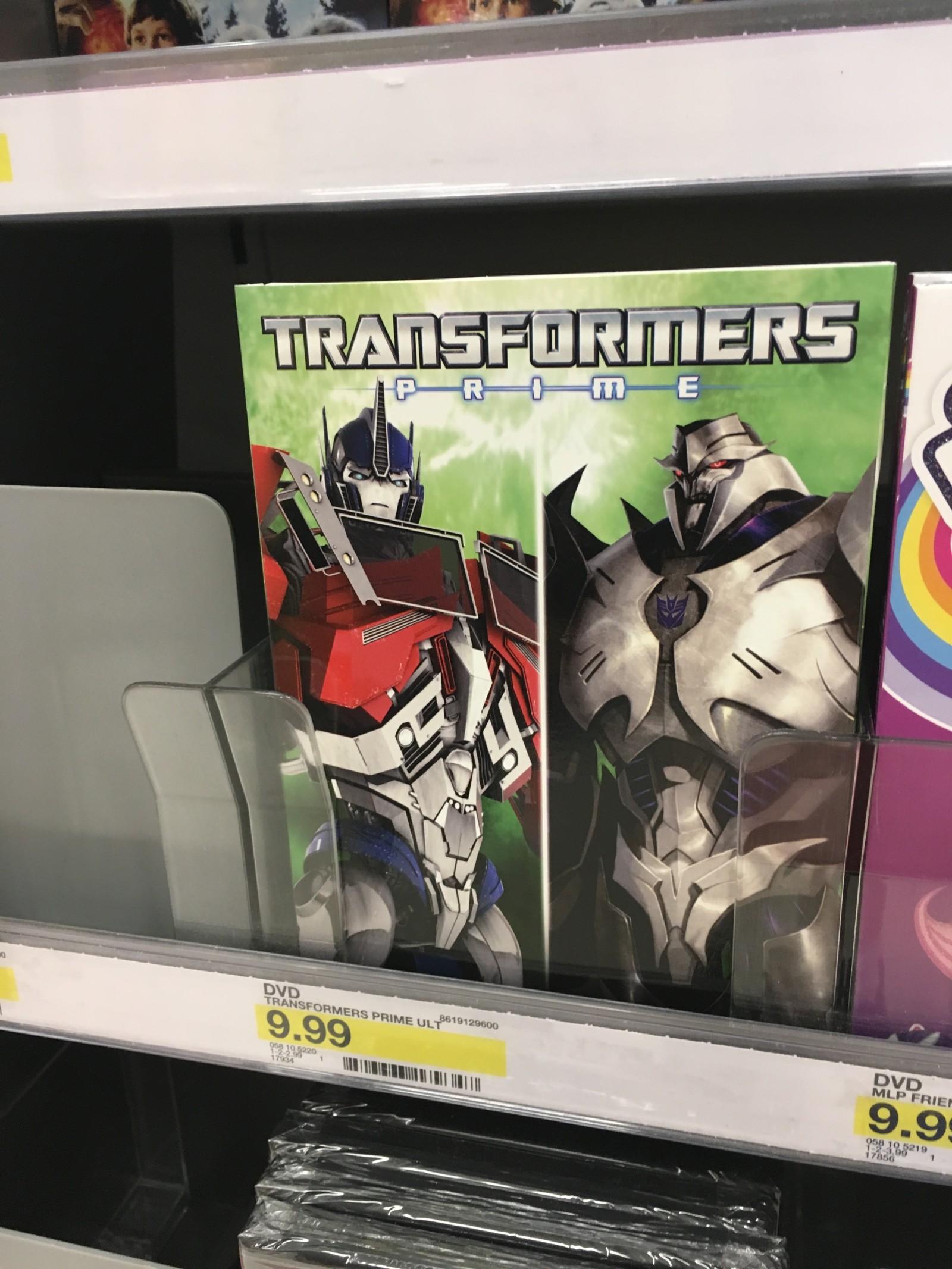
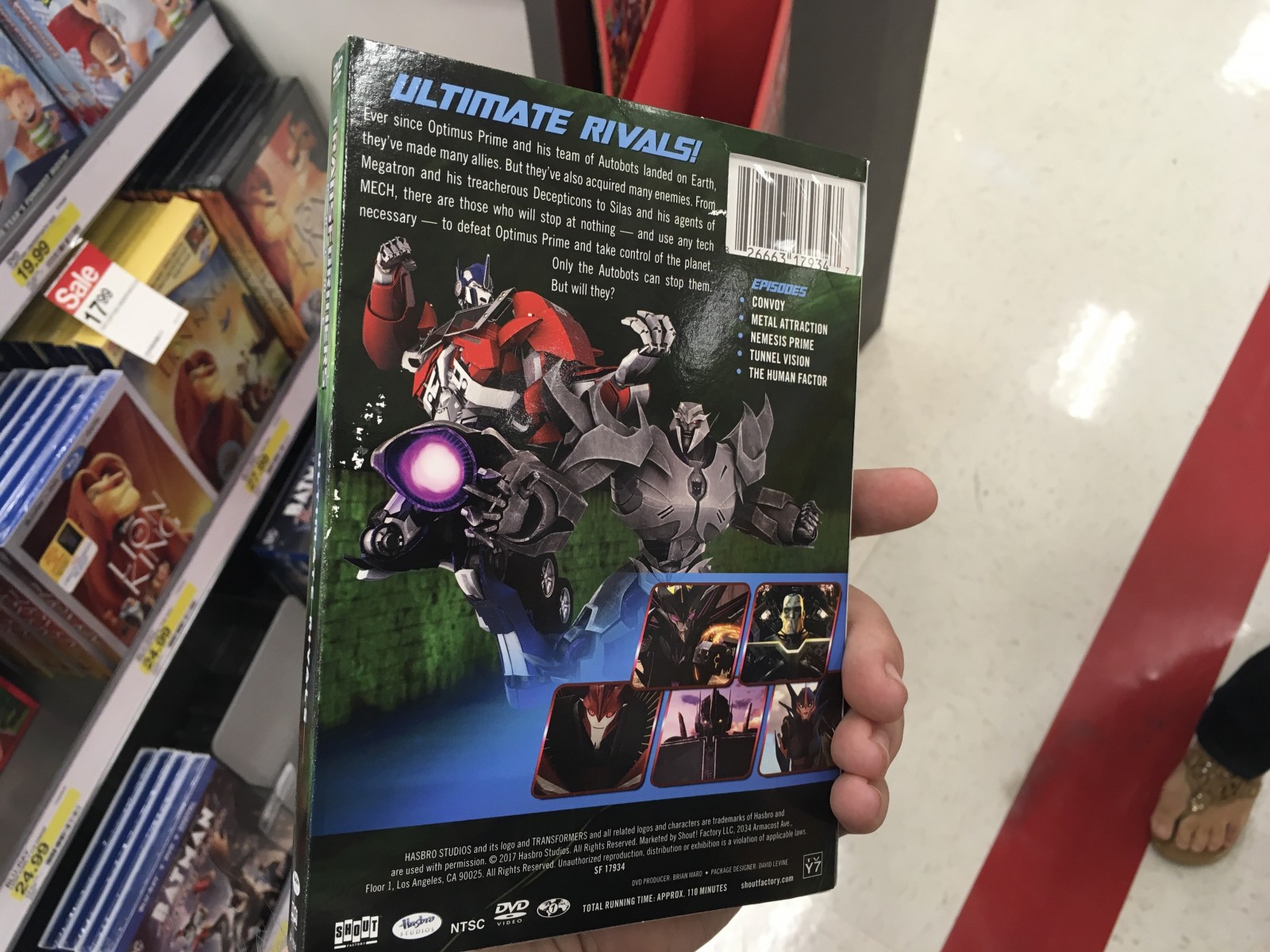
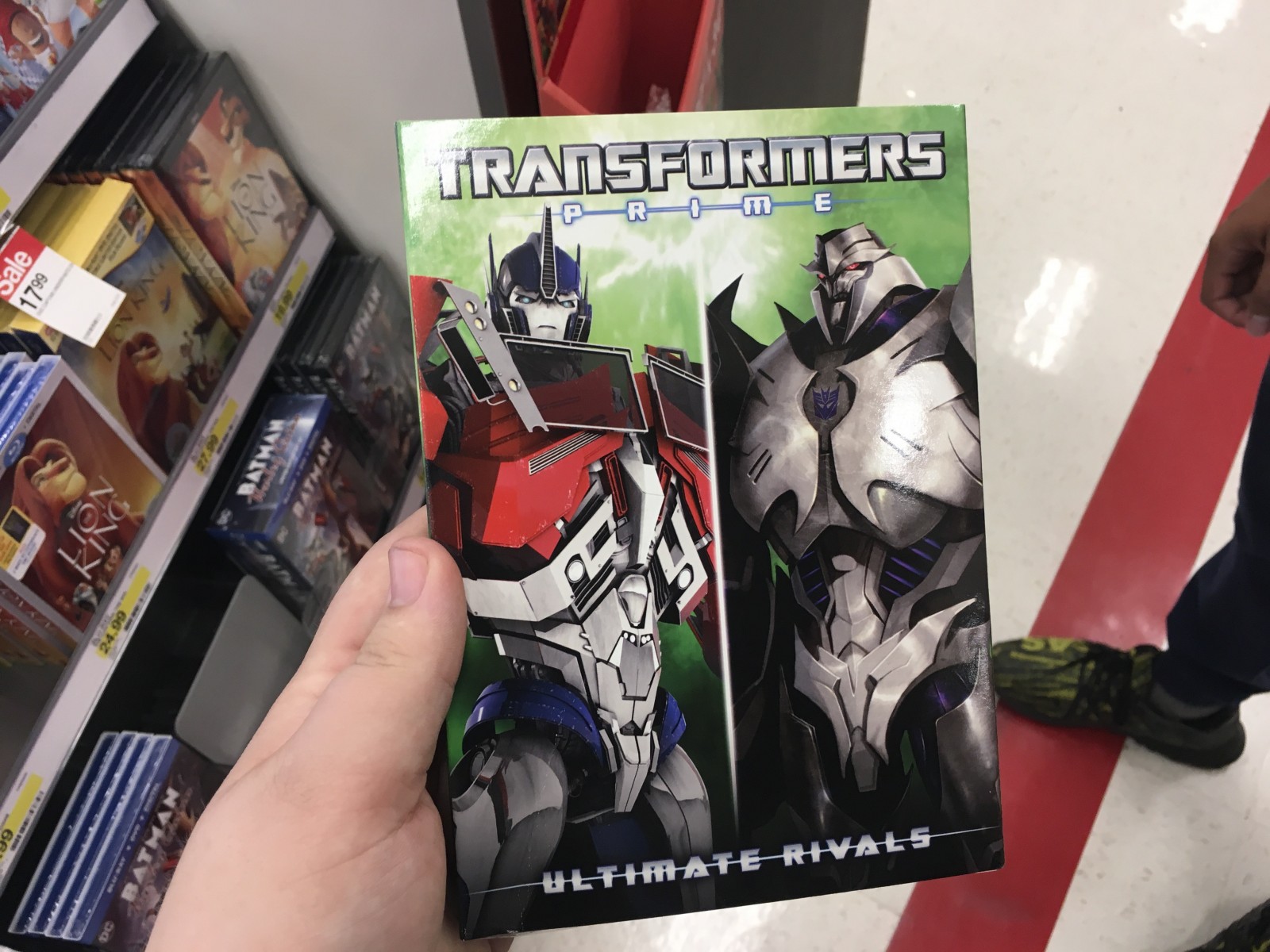
Posted by DeathReviews on September 13th, 2017 @ 8:53am CDT
Posted by Sarahthecutevixen on September 13th, 2017 @ 10:29am CDT
DeathReviews wrote:It is curious that they're grunting out another pared down DVD mini set from a series that was cancelled years ago. Like the people who enjoyed the series don't have all the full season DVD sets already?
Gotta milk the cow till nothing but dust comes out
Posted by Sabrblade on November 4th, 2024 @ 5:57pm CST
The full interview can be viewed in this video from the livestream, from 04:00:59 to 05:01:59:
BUT, I've actually gone to the trouble of transcribing the entire interview for all to read below, cleaning up a lot of the redundant repetition and "fluff" words like "uh", and "um" for better readability:
----------------------------------------------------------------------------------------------------
Right, everybody! So. we are moving on with The Big Broadcast 2021 and I am super excited here. This time it's the people that brought you Transformers Prime. Welcome to The Big Broadcast 2021. Thank you all so very much for taking the time to join us this afternoon. Let's start at the beginning. Please start by introducing yourselves.
Jeff Kline: So, I'm Jeff Kline. I was one of the executive producers, along with Bob Orci and Alex
Kurtzman, of Transformers Prime, one of the co-developers; that group plus Duane Capizzi. And I've developed and executive-produced, I think, about 20 animated series over the years. Four for Hasbro, a whole ton for Sony. A lot of us worked together for the first time on various Sony shows, and you'll see that'll be a recurring theme. We've all worked together, for each other, with
each other, over the years. And Prime was sort of my very specific attempt to put the band back together.
Duane Capizzi: I'm Duane Capizzi. I have written and produced a ton of animation for TV for kids, mostly in the action adventure realm, and Transformers Prime was definitely one of one of the highlights of my career so far. Thank you.
Marsha Griffin: Hi! My name is Marsha Griffin. I was a story editor and a writer on Transformers Prime for three seasons. And I am, I've been a writer and a story editor and a showrunner for twenty-five years, now, thanks to Mr. Kline. And, yeah, this was a great opportunity for all of us to kind of work together. Some of us had worked together in the past, some of us hadn't, and it was an amazing opportunity for all of us to come together for this series. And it was a great opportunity, and I basically almost loved every second of it.
We'll come back to the moment you didn't very soon. Uh, Steve!
Steven Melching: Hello, I'm Steve Melching. I was a writer and story editor on Prime, and I've been a writer/story editor/producer in animation for almost thirty years, now. I've had the good fortune of working on a lot of great shows. I started working with Jeff and Duane on the Sony shows like Jackie Chan Adventures and Godzilla and Men In Black and all that good stuff. I went on to work for Lucasfilm on Star Wars: The Clone Wars and Star Wars: Rebels, Marvel for Guardians of the Galaxy, and Netflix with Duane on Carmen Sandiego, and Warner Brothers--Batman: The brave and the Bold was a lot of fun--and most recently Dota: Dragon's Blood, now on
Netflix. And I was the bass player in the band.
Uh, Nicole?
Nicole Dubuc: Sure. You guys have kind of already heard, if you were at the Rescue Bots panel, so I think this is the fourth show I worked on with Jeff Kline; he brought me on for that. And, yeah, also a writer/story editor/producer. And love working with this team. I was on Prime for the first season and then freelanced on the second season.
Jeff Kline: Because you were busy doing Rescue Bots.
Nicole Dubuc: Exactly.
And then finally Joe.
Joseph Kuhr: Yeah, hi, I'm Joe Kuhr. I was a writer, a season one staff writer, for Transformers Prime, and freelanced season two, and I have been writing animation since--I'm looking at my IMDB, it looks like 1996, '95. And, this was an amazing opportunity. I was not a full member of the band prior to this. I had not worked with Jeff. Jeff, did you do Extreme Ghostbusters?
Jeff Kline: Yes.
Joseph Kuhr: I did do an episode of that for Sony. Okay. But I had worked with Duane and Steve prior to this. Duane, most notably, on The Batman at Warner Brothers. And I worked at Warner Brothers for about ten years before Duane invited me over to Prime, and it was great. What an amazing team of people to work with.
Duane Capizzi: So basically, if Jeff is Mick Jagger and we were the Stones, Joe would be Ron Rood.
Well, I was about to ask, given that we've been using this band metaphor, I'm just wondering, what instrument is everybody playing, here? We know Steve's on bass, but...
Duane Capizzi: I just do the the bass drum thump. Because I'm the backstop. Right, Jeff?
Jeff Kline: Yeah, so, Duane, it's always possible that, like with the partition, we might replace Duane with a different little boy at some point during the series, but... Let me point this out. I do want to say, though, it's really unusual in the world of TV animation--kids animation, especially--to have a writing staff of this size. And especially of this level of expertise, I mean. Almost everybody here had been story-editing or at a higher producing level before they came onto Prime. And it's pretty unheard of. You know, this was Hasbro's first foray into this level of animation. It was one of the premiere shows for The Hub. And they really did let it, y'know, Therese Trujillo and I had sort of a plan for "We want to treat this like a primetime show," and the various partners were sort of willing to go along for the ride with that. Which is why, for those who love it, and, I think it's so good, it's because you've got basically 50-60 shows worth of talent just on this call right now.
Steven Melching: You're saying our band was a super group!
Jeff Kline: That is what I'm saying.
Steven Melching: The Traveling Wilburys or something.
Jeff Kline: Yeah, that's actually a better metaphor, yes!
In the previous call when Nicole and Jeff were talking, there seemed to be a common thread, with the exception of Nicole, where everybody sort of falls into animation, and I'm just curious as to how you all ended up in this wonderful world that was cartoons.
Marsha Griffin: I can start if you want. It definitely wasn't a straight line, it was definitely a falling into. There's no question about it. When I moved out to Los Angeles, I was a TV news writer, I had a career as a TV news writer, and then I took a brief detour into game shows. I was a writer and producer on game shows. And then I went to work in TV movie development, and that's where I met and became friends with Jeff Kline. So this even goes way way way back prior to my animation time. And so Jeff and I met, we became friends, and it just so happened that, over lunch one day, I had been working in different fields, but I had spec scripts just like everybody else. It's like "wanted to break into TV, want to break into movies, had spec scripts piling up, nothing was going anywhere." And Jeff and I were having lunch one day and he said, "Hey, I just had a writer fall out of an animation script, can you do it?" And I was like, "I don't know, can I? And he was like, "I think you can," and that was on the show Jumanji for Sony. And he gave me two weeks, I only had two weeks to write my very first script, because they were way behind deadline. And I did it, and that was sort of the start. I started writing animation for Jeff and pretty soon moved up into the story editor level, and I did that. I was basically a writer/story editor for eighteen years, which included Prime. And then I jumped over to the executive side and was at Marvel for five years, where I was the VP of Animation for the company. And then most recently jumped back into the creative side and now I'm working for Mattel as a showrunner. So, yeah, it's definitely been a hopscotch and just all over the map. But it was definitely a falling into over lunch. But it started with Jeff. That, I mean, I think, a lot of us, it's sort of like "Where did it all begin?" Well, my path is Jeff, that's my path.
Thanks very much for that. Joe?
Joseph Kuhr: Well, yes, again, it was a falling into. I did go to NYU film school. But I guess my ambitions were to combine the neuroticism of Woody Allen and the ultra violence of Martin Scorsese. And... it didn't happen, Quentin Tarantino ended up doing it really well. But, after school, I stayed in New York for a couple years working production/post-production. Some friends were encouraging me to move to LA. I went out, but I didn't have a job lined up, but I went to a temp agency that I had read about in an old magazine called Premiere Magazine. It was a film magazine that would send people to the studios, and I wore a suit. And everybody else was in bike shorts, and they looked at me and they said, "We can send you to Disney Feature Animation tomorrow. Wear the suit." And I went, and on my third day, my boss is there, said, "Stop wearing the suit, people think you're an executive. We love you, though." And I ended up working there on Rescuers Down Under and The Lion King in various PA capacities. And while I was there, I sold a story to them. There was an American game show called The Gong Show and they had their own version of The Gong Show in Disney Feature Animation--I don't know if they still have that--where everybody with an idea to pitch to the studio gets in a room, everybody working there who wants to pitch, and they pull your name out of a hat you get up and you pitch. And I did that and I sold them something. And not long after that, although there was some hopscotching around, a friend of mine was working on an animated action show and said that her boss was looking for writers, and she was willing to talk to me because I'd sold the thing to Disney, but she actually hired me on the strength of a Seinfeld sample I had written. And you're always told, "You have to give something that is very much like what you want to do but isn't exactly the thing you want to do." This couldn't have been more different than what they wanted, but she liked it, she hired me. And that was a show called Mutant League. And I did a bunch of episodes of that and some live action for her and, again, I'm not gonna get all the details but through more hopscotching and more people and, eventually, I ended up working for Warner Brothers Animation for ten years doing a lot of superhero stuff, and while I was there I met Duane. And that led to Prime. I did other shows after Prime. And for the last few years I have been living in Chicago and teaching screenwriting, while also developing work. We ended up having kids and my wife is a tenured professor, and she can't get fired, but writing jobs always end. So we decided we had to be in one place and this needed to be the place. This is not Chicago, though, this is Cincinnati. We are we are traveling. So you're catching me on on a trip on the way to Florida.
Getting out of the house, that's the important thing at this point.
Joseph Kuhr: Getting out of the house.
Yeah. Steve, what about yourself? Tripping? Walking?
Steven Melching: Completely accidental. I went to film school at USC in the '80s with every intention of graduating and becoming a famous movie writer/producer and was writing my movie specs after graduation. No intention whatsoever of writing for TV animation because, while I watched cartoons my whole life, even well in through high school and into college. Y'know, let's be honest, a lot of those cartoons were pretty junky. They were just kind of cheap means to sell toys and sugar cereal. So, I don't think anyone at the time really aspired to write for animation because it just wasn't that good. But around that time I graduated and was doing the various odd jobs like script reader and production assistant and puppeteer at Universal Studios, I got to know, through friends, the entire executive suite at the Fox Kids Network, which was a brand new network at the time, the kids division of the big FOX Network, which was just getting started. And that was kind of ground zero in my mind to the modern animation renaissance, and they were doing a lot of exciting things with Tiny Toon Adventures and Animaniacs and Eek the Cat and Power Rangers and all that stuff. And one of the executives there knew I wanted to be a writer and encouraged me to read the scripts for his new show, Batman: The Animated Series. Like, "Cool, I love Batman! I read Batman comics all the time!" So he encouraged me to Xerox the scripts as they came in, and I read them and, like, "These are freaking great! This is really cool! I like this!" And so he encouraged me to write a spec. So I wrote a spec for Batman: The Animated Series and turned it in and, wouldn't you know it, the day after I turned in my script that g****mn Paul Dini turned in his script with the exact same story, as mine. But that was, it's like, "Ah! I'm on the right track! I know what they want!" But this executive, Sidney Iwanter, thought my script was good, but said, "Batman's winding down. That's the past. The future is X-Men. X-Men: The Animated Series" I'm like, "Cool! I love the X-Men! I read X-Men comics all the time!" So he gave my spec to Eric Lewald who was the showrunner on X-Men, and Eric thought it was good also, and gave me a shot. Me and my friend, Dave McDermott, pitched a story. He liked it, he bought it, we wrote the script, we turned it on time, we didn't screw it up. So he let us pitch more scripts or more stories, and we sold more and didn't screw those up. And the animation community, especially at the time, was relatively small, so everyone kind of knows each other, and as new shows are coming online, people ask each other, "You got any good writers?" So it was purely through recommendations, I think probably through Tom Pugsley and Greg Klein, initially, or Dean Stefan, that I started writing on the Sony shows, one step removed from Jeff and Duane. And probably through that I got on Jeff and Duane's radar, so, I went from Eric being my patron to Jeff and Duane either together or individually kind of being my patron and hiring me, and it just kind of went from show to show and, suddenly, thirty years later, I'm an animation writer-producer!
Steve, I was about to say that you broke my heart with your comments about 80s cartoons but then you turn around and say "I started on Batman: The Animated Series and I'm like, "I can't complain about that, to be fair, though."
Steven Melching: Look, I have a lot of affection for those '80s cartoons, I really do. I watched them. And it gave me no greater satisfaction that my dad was in the Air Force and he would come home from a hard day working in NORAD and find his teenage son sitting at the kitchen table watching cartoons and drawing, y'know, during Dungeons & Dragons maps, and he's telling me to go get a job, "Get a job!" Be like, "I don't want to work at the local Wendy's!" Y'know, "I want to write stories!" And, years later, I'm making more money than he did, writing for the cartoons that were sequels to all those shows that I was watching as a kid. So there!
Revenge. Duane, what about yourself? How did you get involved in animation?
Duane Capizzi: Oh man. I think for me it was, it felt predestined, yet also accidental. I think predestined because, growing up as a kid, before it was fashionable to be a nerd, back when if you were a nerd in like comic books and science fiction and uh genre television shows and cartoons, certainly, you would get picked on. So, whereas now if you don't know all of the mythology of Star Wars or the Marvel Universe, you get picked on as an eight-year-old, I would imagine, because it's cool. But, back when it wasn't fashionable, I was just obsessed with all this genre stuff, comic books, cartoons. And lived at giant robots, Gigantor, it was Gigantor when I was growing up, not to age myself but I just did. And, I always told stories growing up, I would actually trap my grandfather after dinner out on the front porch and go, "Grandpa, it's story time!" and spent about an hour pitching him this entire spaghetti western plot that I came up with. And so, lo and behold, cut to when it was time to go to college, I decided I wanted to... I always thought I would get into the entertainment field and, but I wanted to do it through, y'know, writing through a knowledge of the great books, and I decided, instead of going to film school, to study literature, which I did. I wound up falling in love with it and wound up applying for grad school, got accepted, that was gonna be my new path. And then that's where the accidental left turn sort of happened. A very good friend of mine at the time, and to this day, Kevin Altieri, who was one of the original directors on Batman: The Animated Series, was just beginning. And I met him in a comic book store. So, that was sort of my circle. Some of my best friends I met in either record stores where we start conversations, "Oh, you like prog rock too?" y'know "I was that Gentle Giant album." So I met Kevin in a comic book store, he was just starting his career as a storyboard artist--this was before Batman--and he was working at DiC on things like Inspector Gadget and things they had going at the time, and he said, "Hey, why don't you come on in and pitch some stories?" and I did and um the rest is history.
Let's talk a little bit about Transformers Prime, then. So, Jeff, Duane, along with Orci and Kurtzman, you were the show-, you guys created Transformers Prime. Can you tell me a little bit about how the origin of this project came about?
Jeff Kline: I'll start because, I think, because I got there a little before Duane did and then I'll hand it off to you, Duane. Hasbro the toy company ended up buying a half interest in the network, which they renamed The Hub. And Transformers being one of their marquee properties, they knew they wanted that to be one of the first shows to really launch this new network. Kurtzman and Orci had written the Transformers features up to that point, and I think Hasbro probably assumed that they wouldn't care about a cartoon series, but they were probably contractually obligated to ask them. And Bob and Alex loved animation and really wanted to be involved. So I was actually out in LA pitching live-action pilots; I had moved to the east coast by then. And we had the same agents, meaning Kurtzman, Orci and I had the same agency. So, I took a meeting with them as a favor to kind of, like, just help them figure out, "Hey, we're going to do this animated series. How could we do it? Who should we talk to?" And, actually, Duane was one of the first names I brought up to them, and Marsha Griffin was another name I brought up to them. And I really spent about an hour with them. Great guys. Left that meeting thinking,, "Okay, I did what I said I would do." And so, I got the word that I'd sold a couple pilots that day, was heading home and by the time I got home, Kurtzman and Orci's office had called and said we should do this together. So, at that time, Hasbro had no infrastructure to do an animated series, there was nothing. There were no computers, no desks, no anything. First person I called was Therese Trujillo, who had been my line producer--she had come up at Sony as well--and she'd been a lot of things with other stuff, and she joined right away. We were working out of Kurtzman and Orci's offices on the Universal lot for a couple of weeks. And then Duane came aboard, then eventually Dave Hartman, and we started to put the band back together. It's a lot of the folks who did Jackie Chan Adventures and Men In Black: The Animated Series. And I will now turn it over to Duane because the the first thing we had to do was come up with "What is the show? Who are the characters?" Hasbro did give us a 400-page sort of "This is the canon of everything we've done. It contradicts itself periodically, and it doesn't all work. We'd like you guys to sort of kick off as if we're starting over. You don't want to diss any of this, you don't want to dismiss any of it, but we really need to bring new people in into the tent. So can you kind of reimagine this for both those who are already fans and those who've never heard or seen it before?" And I'll turn it over to Duane.
Duane Capizzi: Yeah, I think, Kurtzman and Orci were definitely like mega fans of the original series and it was their nostalgia. I think I can speak for both Jeff and myself where, y'know, we weren't. I think we were at the wrong age or something, I was actually in college when Transformers first came out. And so, for me, it was... And then, look, I understand nostalgia. My entire being is is driven by it. And I looked at it and I was like, wow. You know, I get it, but so much of it just didn't seem to make sense in the original series, y'know, what I dipped my toe into. And then we had the features at the time, which were obviously... a mega phenomenon, which, you know, amazing effects. But the Autobots and Decepticons themselves didn't seem to have much personality. I'm not saying anything new, by the way, so, Kurtzman and Orci really gave us permission to be entirely character and story driven. I think Jeff and I agreed on one thing: It's like, we want you to laugh, we want you to cry, we want you to forget that the Autobots are these mechanical creatures from space. We want to humanize them, and... that was, like, primarily--no pun intended--what we set out to do. And then, from there, it was really, and I might be getting out of myself a bit but, production-wise, we had limited sets we could build episode to episode, and so that really forced us to drill down into character and story, and in a way that limitation, wound up being a strength for the series, and I think the characters are fantastic. They still live with me to to this day. So, I haven't kept up with Transformers the brand too much since Prime, so I don't know if some of the characters that we sort of developed have lived on in those incarnations, but I would hope they would.
So how did everybody else get involved in Prime then? So, Duane's there, Jeff's there, how did everybody else join the band?
Marsha Griffin: Well, I don't know how to all transpired. I can just tell you the funny story. So, Jeff and I have actually been friends for much longer than I've been in animation, way way before that. And my husband and I were actually in Maine, which is where Jeff and his wife were living, are living--I'm not gonna give them your address, Jeffrey, but it's somewhere in the vicinity of Maine. And so my husband and I actually had plans to go to Maine to visit Jeff and his family and then tour the state. And so Jeff calls me right before we're about to leave and says, "Hey, funny story. I'm not gonna be there. But still come, and still stay with us and everything." So, we already had the plans, so we went to Maine and we were enjoying a lovely vacation while Jeff was back here working on something that I was not really aware what it was. And my husband and I are off touring one day, and I am sitting on a dock in a small Maine town, and I get a phone call from Jeff in Los Angeles, saying "Hey, do you want to come work on Transformers Prime?" So that's where I actually found out about it, on a dock in Maine. And visiting Jeff, allegedly, who was not there; we were staying with his wife and his daughter. So anyway that's how I came to it. I don't know how they decided to pick me but that's how I actually found out about it.
Steven Melching: That's hilarious. A couple years ago, my wife and I were visiting Maine ostensibly to visit with Jeff and tour the state. And Jeff was also in Los Angeles!
Marsha Griffin: I think it's a ploy. He actually says "Come visit," and then he finds out when you're coming, and then he leaves.
Steven Melching: Try not to take it personally. But, no I don't remember exactly how. I think either Duane or Jeff called me and said, "Hey, we're gonna do a Transformers show and we're putting together writing staff." And I'm like "Cool. Sounds great." And then I recall we had our first couple of weeks of meetings at, was it an agency, was it...?
Jeff Kline: William Morris's offices.
Steven Melching: William Morris.
Jeff Kline: Yeah, they had moved offices and we took over, and that was our production offices for the first, probably close to a year. Right, Duane? I think we were in there for eight months, nine months, before we moved to the Valley.
Marsha Griffin: Yup.
Steven Melching: Yeah, it was this place in Beverly Hills that was really difficult for me, it was a long drive. But we had our we had our--maybe I'm jumping ahead a little bit--but this whole group would would meet with Kurtzman and Orci, and that's where we did our initial brainstorming sessions after Jeff and Duane and Alex and Bob had written the the series bible, and we started breaking the five-part pilot series and then the additional episodes after that.
Duane Capizzi: I remember the giant table. That was like the biggest table I'd ever seen.
Marsha Griffin: Right? It was huge!
Duane Capizzi: Yeah.
Nicole, what about you? How did you get involved?"
Nicole Dubuc: Same thing. So, I got the phone call from Jeff and I was like, "Of course."
Were you in Maine?
Nicole Dubuc: I feel like I missed out on an important part.
Marsha Griffin: I would have taken you with us. I'm so sorry.
Jeff Kline Is it possible you were eating a lobster roll at the time you got the call?
Nicole Dubuc: No.
Marsha Griffin: No, I was not eating your lobster roll. Oh, maybe Nicole was.
Jeff Kline: Yeah, maybe.
Nicole Dubuc: So I want to use my time to tell my story that I actually have an artifact from early times. Do you guys remember these?
Duane Capizzi: Oh, yeah.
Nicole Dubuc: Like, and I think this might have even been from William Morris and migrated to The Hub, I can't remember.
Marsha Griffin: Is that something you stole?
Nicole Dubuc: I mean, "appropriated". And then the other thing I want to say is my Facebook reminded me that ten years ago we were at the Emmys for Transformers Prime. All of our pictures are from today, so I think...
Marsha Griffin: Oh, that's awesome!
Nicole Dubuc: ...having this conversation.
Marsha Griffin: We turned it out that day.
So, Joe you're in Maine and... D'you get the call?
Joseph Kuhr: I was on a run in Santa Monica when my phone called, a phone call came from Duane. And I was very excited. He said I could call him back, but I just wanted to hear all about it right then, and I kept running. I didn't really know much about Transformers prior to that, I was aware of it. Like Duane, I just wasn't the right age to be watching it when it came out. I think I was in college or, yeah, I think I was in college. I had seen the movies. I felt about them very much the way I think Duane and others felt about them. Y'know, they were huge, but it was a little hard for me to, y'know, dial in to the characters and what they wanted and who they were to care about them. But this was a very exciting opportunity, the way it was explained to me, and I was very excited to get to join, and yeah.
Jeff Kline: The one thing I, by the way, I want to say is, previous panel we talked about how, for a number of us, we were initially, at least, we were thrown together, Brian Hohlfeld and I were thrown together, on Pooh. and then we ended up working together on multiple things and Nicole. So that's very much what it was for Duane and I, as well. I was doing Jumanji at Sony, Duane was doing something. Richard Raynis, actually, is the one who introduced me to Duane. And when you find someone that you sort of share, if not a voice, at least a point of view with. Duane was as persnickety about the quality of script as I am. He believed as much in "There's no reason to talk down to this audience. There's no reason to accept shortcuts in the writing." Yes, it's just an animation script. Yes, it's just a cartoon. But that doesn't mean we shouldn't aspire to be as emotionally complicated, as interesting as twisty-turny as a primetime show. So we worked together initially at something and ended up doing probably four or five shows together in different combinations. Because when you find someone that you have a shared point of view with, you want to work with them again, hence the people on this call. Everybody on this call had a connection to one or both of us, previously. And a number of them, as Marsha was saying, Tom Pugsley had never even written animation before they started working for either Duane or I. But that was because we felt like sometimes it was easier to train people to do it the way we really believed it could be done, versus getting someone who'd been doing it for a number of years maybe following some bad rules or following bad advice. So we brought a lot of people in over the years who had never written animation before who've gone on to pretty substantial careers, actually. Just wanted to give Duane some props for that as well.
Marsha Griffin: Yeah, by the way, and I'll just interject this, it was more helpful than my agents. And even though I love my agents, everything literally ties back to Jeff in terms of that. So, I haven't actually given him the commission over the years, but I've rewarded him with my friendship.
And then he disappears to LA when you try to visit.
Marsha Griffin: Yeah! Yeah.
Nicole Dubuc: I have a question for you guys. Didn't we have a novel that we were all given at the very beginning? Do you remember that? "Read this novel, this is part of the Aligned continuity."
All: Yeah.
Steven Melching: We made our writer's assistant read it and tell us what it was about.
Jeff Kline: We should mention Mairghread Scott, who's not on this call. Mairghread Scott was our writer's assistant. And was, in some ways, the keeper of the Transformers lore. Like, she was deep deep in, so, with various levels of knowledge of the Transformers world. And, by choice, Duane and I didn't want just acolytes because we wanted people who weren't familiar with it, who'd ask the questions that a new viewer to this world might ask. Like, we wanted to bring new people into the tent. So you can't do that if it's all being written by geek fans. You've got to have people who are like, "Wait, why did why would Optimus do that? That doesn't make sense," and then come up with the reason to kind of explain it. So, Mairghread was the keeper of lore and she'd be the one that we'd turn to and go, "Can we do that? Does that make sense? Does that contradict?" And she's kind of a genius about that stuff, and a great writer, and has had a very successful writing career, herself, now. But I'm pretty sure Prime was her first writing.
Marsha Griffin: It was, yeah. She did the first script for us, yeah.
And then went on to be the first female writer on a Transformers comic. So, tell me a little bit about the story of Transformers Prime and how you began to develop that as a team.
Duane Capizzi: I think we wanted to start with something really compelling that was a grabber. And we wanted to. A lot of the TV I was watching at the time were the HBO shows and, y'know, Battlestar Galactica, by the way, was sort of a spiritual sort of influence on us in the way that, like, we did with Prime. It did a very sophisticated, very adult reboot update of something from the '80s that was a bit more charming and nostalgic for some, and so, I think, there's a similarity there. But we're like, "Why don't we just do a Sopranos and show that if somebody dies in this world they die." But, it also really kicked off the emotional journey of this band of Autobots who have been through these wars. Y'know, Arcee's emotional state, certainly. And, by the way, Arcee is certainly one of the characters that I'm proudest of as far as the way we updated her and made her, sort of gave her new life, and really made her a proactive character and somebody with a rich inner life. So, I think that was the idea there. And then, The Rock was somebody that Kurtzman and Orci had a relationship, and I think he did it as a favor. And he was a delight to work with, needless to say. And look, we we brought him back. If I remember, we did a flashback episode so that we could see more Cliffjumper later on. The idea of starting with a five-parter, starting that epic, and almost like, "Boy, how do we top this?" They say "never open with a showstopper," right? Well. And yet, the series just kept on becoming more epic and more epic and I think we really did manage to top ourselves as the show went on.
Jeff Kline: That request for a five-parter, by the way, came from The Hub. That was there because they wanted an event. We were timed around the launch, but we didn't actually, I don't think we launched on launch day. We were right around it, but they wanted a big event.
Marsha Griffin: Yeah, they had already launched because they had a lot of other programming on before we came on.
Joseph Kuhr: Whose idea was a seven-parter at the end of the season and the beginning of the next season?
Duane Capizzi: That was amazing, I know. it was Unicron, we had to step up to the challenge of the context. I did want to touch on some of the things that Jeff was saying earlier though, which was, like, right around that time there was sort of a sea change. And Jeff and I, at Sony, certainly, and Richard Raynis as well, we were sort of like the creative brain trust there. And like Jeff was saying, we we wanted to elevate the material, and we wanted to make shows that surprised you by how good good they were. Like, Jackie Chan Adventures had no right to be as good as it was. And people to this day still remember that show and and love that show, just as a for instance. And I've always been been approaching material that way. You want to make it the best that it can be, you want to surprise the audience, you want to be one for the ages, not just a job. But there, especially in the earlier days, there was always sort of a friction, or there could be friction with the network, for example, and "Hey, these are kids shows, you're overthinking it." And, coming into Transformers in Transformers Prime, I don't think we were being dark just for dark's sake, but Kurtzman and Orci really gave us the opportunity to tell the story that we wanted to tell, and it was sort of like with their permission. But I think, at least, I was going into this going, "Can we? Who's in charge, here? Is this going to be one of those situations where they really want it to be a kids show?" And it obviously soon became clear that it wasn't and we just went for it.
Am I right in thinking there was intending to be a season four and, more to the point, there was intending to be a very different season three for Transformers Prime?
Duane Capizzi: Can I speak to that? I could answer this quickly. It wasn't a season four because, thankfully, we got to end the series and then some, and then do our our follow-up movie to really tie up all loose ends, and put the Autobots on Cybertron, which we had always planned to do. It was the shift from season two to season three we had a very, one of the more terrifying meetings that they've ever been in, that we wound up making a lemonade out of. They called a big meeting when we were waiting for our season three pickup, and they said, "Okay, Predacons are important to us. It's gonna be our entire upcoming toyline. The new show is going to be Beast Hunters. Go!" And Jeff and I were like, "Whoa, whoa, wait a second! Okay, do you guys know that season two ends with the destruction of the Autobot base?" And like, literally, we were being asked to create a new series. Transformers Prime was done. And so it was a crazy meeting. But we initially, I think, the way season two ended as scripted and storyboarded it was, y'know, "wisping smoke from the Autobot base, cut to black, and see you next season." And what we sort of improvised in the meeting is... Oh, and they also wanted a new Optimus Prime to sell, a new body. So we said, "Well, look, we were gonna open season three to show how everybody secretly escaped through secret passages," that kind of thing, and then they were on the run. But we said "What if"--brainstormed in the meeting with Jeff and I--"What if we see Optimus's body lying in the rubble? He was the last one to leave, to make sure everybody else was safe, and we leave him for dead. We see his eye blink out, we see the destroyed hand sticking out of the rubble." And that was how we salvaged it. And we fought like heck. And we said, "Look, please! You can't do this to the fans. You can't do this to us. We're two seasons"--do the math, 26-episode seasons, two, it was a lot of episodes--"52 episodes deep. You can't just pull the plug. We need to finish the story." And so we came up with this compromise and I'm sure that process continued well after this meeting. But it was "Optimus is in the rubble, he needs to be rebuilt, that's how we'll give you your new Optimus design so you can sell the toys. And why don't we rebrand?" That's why it's Transformers Prime: Beast Hunters for season three. So that we got to do both. We gave them their Predacons, but we got to to finish out our story. I'm not saying it wasn't a challenge, it really was. But that's it. So there was never intended to be a season four. I think that, once we came to that compromise, and compromise in the best possible way, I mean. I think it's amazing. And kudos to the team for pulling it off, without really compromising the this story.
Steven Melching: I remember Duane walking into the writers room one morning and saying, "Okay! We have to add a dragon to the show!" and Marsha and I looked like, "A WHAT?!" The other point of uncertainty in season three, as I recall is, as we were started to break season three, we didn't know how many episodes season three was going to be.
Marsha Griffin: Right. Exactly.
Steven Melching: Is it going to be 13 episodes? Is it going to be another 26? Is it going to be 13 and a movie? Is it going to be 26 and a movie? And that kind of was in flux for a while, as I recall.
Marsha Griffin: Right, and it kind of makes a huge difference. It's not a little matter, it's a huge matter. So, yeah, we were like we're like, "Dragons, and we don't know when it'll begin, and what's the beginning, what's the middle, what's the end, and when?"
Jeff Kline: And again, it's a huge deal because we were, by design, doing arcs, we were doing story arcs. If it had been, again, the Law & Order model where each episode is wholly self-contained, then the number of episodes you're doing in the season is less of an issue. But we were plotting out arcs based on how many episodes we had to service that arc with. So we really we needed to know.
Steven Melching: And I think in our minds it was going to be another 26 but it was, it suddenly became uncertain, like, can we collapse this into 13? Which, ultimately, I think we did very well.
Marsha Griffin: I remember that, I remember, like, planning it out and thinking it was going to be 26, and we were starting to talk about that because you have to plan for that because it would be easier to condense it than it would be to actually then try and tread water for 13 episodes, which you really can't do. But then, I remember the moment of when we had to collapse and then, it's not just a matter of "Oh, we'll take this piece and put this in the episode." It was literally whole cloth having to try and figure out "What do we kill? What do we keep? What can we combine?" And it was just, I remember Steve and I, and Duane, lost our minds.
Duane Capizzi: We collapsed.
Marsha Griffin: We collapsed, yeah.
Duane, you mentioned earlier on characters that have moved on from Transformers Prime and really cemented their legacy. One of those characters was Knock Out. And my friend is absolutely desperate to hear any insight that you've got in regards to that particular character, who has taken on legendary proportions since the end of Transformers Prime.
Duane Capizzi: Boy. I was not aware.
Oh, yes.
Duane Capizzi: Boy. I would almost kick this over to Jeff, but I will say it was interesting to have sort of two versions of the "despicable dandy" character in Starscream and Knock Out. There were similarities but that was tricky to pull off, and how are they different. But, gosh, I think so much of Knock Out was really with the actor, Daran Norris.
Marsha Griffin: Daran Norris. It was Daran Norris.
Duane Capizzi: Yeah, yeah.
Marsha Griffin: It really was him.
Duane Capizzi: Yeah, I know, that's just one of those characters where, when you hear the voice, you write to it. And yeah I'd have to say a lot of it is giving that voice in our heads credit once we put a voice to the character.
Marsha Griffin: Daran Norris was like this diabolical Frasier Crane, that's what it was. It was like a mad lunatic psychotic Frasier Crane. And he actually does the perfect impersonation. So it was just this getting it. I mean, we had the idea but it grew, he grew, as a character because of Daran's performance, I really believe that.
Jeff Kline: And we should probably take this moment just to... I know we've said this at various times in various other iterations but, this cast loved each other. Like, this was the first time Frank Welker and Peter Cullen got to work together in the Transformers universe since, I think, the original show? So, they were so happy to be back in a room together, they were making each other laugh constantly. And the rest of the cast is a mix of some experienced voice actors, some first-timers, some who had had experience on screen but very little animation experience, so it was just this group that really clicked pretty much from the beginning, and were very welcoming to newcomers. That doesn't always happen. Sometimes the casts get a little bit possessive and anybody new who comes in is an outsider. And this cast was like, again, we've used family metaphors before, but it really was building a family, and this family was very welcoming. So when Daran came in, I feel like they immediately embraced him and he was able to run.
Steven Melching: I got to say, in all honesty, I think this cast and those recording sessions were the most fun I had in my entire career, and it was such a pleasure to go to those sessions because all those actors were just really nice great people. We had such interesting guest stars and character actors coming in to play a handful of episodes, and they were all very welcoming to the new people that came in. And I just remember laughing so much and having so much fun in those sessions.
Duane Capizzi: I have an anecdote. Typically, Jeff and I are very much of the mindset of "best audition wins" and, also coming into sort of a modern update of Transformers, we were thinking "recast across the board". But it was really Kurtzman and Orci, to their credit, really, who had an understanding of what the fans would want and bridging the old with the new. They were the ones who really pushed for Peter and Frank to reprise their roles as Optimus and Megatron. So we were at the first recording session and Peter gets to the point where, and it's a very intense situation with the Autobots and they've got they've got to escape and fast. And there is his line "Roll out!" and Peter goes "Roll out!" or whatever it is that Peter does. And Jeff and I look at each other and we're like "Okay, so, Peter, it's a really intense situation, you know, you guys got to move, the whole place is going to blow, you know, more intense, more from the 'ROLL OUT!' you know." And Peter's like, "That's not how it's done," and we were like "Holy s***." "Well, just give us some backup." "No. I can't do that." Jeff and I are like "What do we do with this situation?" And just a case where, like, it takes a little bit to get onto that wavelength and realize like "Oh, yes, we are we are in Transformers world now. Like, the normal laws of physics and voice recording no longer apply." So, yeah, we got used to that very quickly. But we did not know that his "Roll out!" was a signature, yeah.
Steven Melching: I had never met Peter before that first session and, but of course, I was a fan of the G1 show. I watched it when I was in high school, and I had the toys on my shelf in my college dorm, which might explain why I didn't have a girlfriend in college, but moving on. Peter is a very kind of a small unassuming man, and he steps up to that microphone and I remember just sitting in the booth and suddenly hearing that voice, y'know, "Autobots, roll out!" and like, all the hairs on my arms stood up. It was thrilling to hear that big voice just booming over those speakers.
Duane Capizzi: Steve still doesn't have a girlfriend, by the way.
Jeff Kline: That's not true. I introduced him to his wife. So there's that.
Marsha Griffin: Exactly, that's true. Well, but he doesn't have a girlfriend.
Right, well, listen, we're drastically running out of time, here, and I really appreciate it. But, I would really like to just go around for a little bit and just, if you could, just spend a couple of seconds just talking a little bit about what from your time on Transformers Prime you hold dearest.
Joseph Kuhr: First of all, it was working with this group. I mean, that was amazing. That was a dream job. So I really, I couldn't say too much about that. Also that the show still lives on, and I know that because I have two eight-year-olds and they have loved this show since they were--I let them see things that are entirely inappropriate for their age level--so they've been watching this since they were three or four. And I can tell you, when my son started taking piano lessons last summer, the teacher said "What shows and games do you want to play music from?" and he said "Transformers Prime." And she had the music ready already to teach him because she had had other students asking to play the theme. And, at the beginning of the pandemic, as we were trying to figure out how we were going to keep the kids entertained, I went broke buying up the old action figures on eBay for them. So, for example, we have Bulkhead and Miko.
Duane Capizzi: Wait a second. You travel with those? You're traveling. You're on the road.
Joseph Kuhr: I brought those for this. They don't know it, by the way. They don't know it. They would not be happy that I took their toys. They're never going to see this, right? This is just us. It's just us.
I mean, you've said that you let your kids watch totally inappropriate things already, so...
Joseph Kuhr: That's true, so... And thank you for having me here. I will also say my favorite episode that I'm that I'm most proud of, I think, is "Crisscross". I think that one really came out the way that I wanted. And we were talking earlier--I mean, they all did, but that one especially--When when Duane was talking about the builds and not having money for the builds, I remember saying that we needed a bathroom for one scene. We were told, "You can have a wall. You can have a wall in the back of the bathroom."
Duane Capizzi: Bathroom? Bathroom? We needed a bathroom?
Steven Melching: I needed something where Jack was in the house and his mom was coming in, and Arcee was popping in and out of the garage.
Duane Capizzi: You know, they turn into cars, I was thinking "gas station bathroom". I was like, "I don't remember the scene," anyway...
Marsha Griffin: You can cut that part out, David, y'know, when you talked about earlier, cutting things out.
No, no, this is interesting because Prime wasn't cheap, we know that for a fact, so...
Jeff Kline: Well,like, I want to make it really clear. Prime was nowhere near as expensive as certain people have led others to believe. It was less than a couple of Cartoon Network shows that were squash-and-stretch shows, I know for a fact, because some of the people who worked on our show worked on those shows. And we came in under budget by the time it was all done. In comparison now, by the way, the numbers seem tiny compared to what, now, Netflix and those kind of places will spend on animated series. This was the higher end of kind of broadcast network/cable network, but it was by no means near Clone Wars numbers, or anything like it. So anyway, just had to defend us.
No no!
Duane Capizzi: We've shouted out to the cast and and to Dave Hartman and to Therese Trujillo, but we should definitely shout out to Polygon, our animation partners on this, who Prime would not have looked as amazing as it did if it weren't for them. And they really pulled out the stops on our high-ish but limited budget.
Jeff Kline: And, David, I'll bring it around, a little bit more full circle. So Polygon Pictures--which is the Japanese animation cover that Duane's talking about--the first time Nicole, Brian, and I worked with them was on My Friends Tigger & Pooh.
Just comes back to Tigger all the time. Marsha, what about yourself? What stands out for you for Transformers Prime?
Marsha Griffin: Well, I mean, it was so massive. That's one of the things. So the fact that we actually survived, all of us intact, I think would be one of my, probably very proud of that. And, of course. But, it was not only huge, it was intricate, it was complicated, it was emotional, it was--I mean, it delivered. It really hit every target, every element, that you hoped for in a series. So being able to pull that off over so many episodes because, again, it was a huge amount of episodes, it was a long period of time, and it was ultra complicated. So the just the fact that we managed to create a really satisfying, full three-season arc with these kind of characters, and create memorable characters is part of what I'm so proud of. And the people still love it. But I would have to say, again, I think my most proud--echoing what Duane said--the thing I'm most proud of is Arcee. Again, as you can see, I mean, first season, Nicole and I were there together. Second and third season, it was just, y'know, me. I was the only full-time female on staff. Anyway, I took a personal interest in, it became a personal mission for me--not that everybody else didn't contribute and it's not that men can't write women and women can't write men--but just, I felt like I became the guardian of Arcee. And then I became friends with Sumalee Montano who voiced her, who brought her to life in ways that I don't think I ever expected. And my relationship, my friendship with her, the discussions I had with her, her voice acting, again, I think we created--We all helped create, every single one of us helped create--a completely bad*** character that people embraced in ways. Again, the standard thinking in boys action was, you know, "Boys aren't gonna buy a girl toy," and "Boys don't care about girls," that was the standard thinking, "They don't care about female characters." And I think that we created a female character that was somebody that every single gender, every single person, embraced and loved just equally or sometimes more. And that, to me, creating that sort of, helping create that kind of icon is what I ultimately take away from Prime, is probably the thing I'm most proud of.
Nicole?
Nicole Dubuc: Yeah, in some ways, I met some lifelong friends on this show and that's kind of something I take with me and I'm very proud of. But I think most satisfying, creatively, on this show was when we were writing those giant arcs, because there were so many moving pieces. And sometimes that means sliding episode endings and beginnings and where that's all going to go and just, it's kind of when we all shared a brain the most, and the fact that I feel like we stuck the landings on those and they're great television. I'm most proud of those.
That's great, thanks. Steve?
Steven Melching: Yeah I was thinking along the same lines as Nicole. I don't know if I have a specific memory. But, the show was very challenging to write on for a number of reasons. And as a writer it was balancing all the different needs that the show had, plus the limitations and sort of embracing the limitations that we had to work under. And, as you've kind of heard, Jeff and Duane are very demanding showrunners. They expect our best work, and if it's not our best work they'll call us on it, and we have to keep chipping away at it until we come up with something great. And so it could be dispiriting at times, like, "Ah, I thought that was a really good idea!" But Jeff and Duane say it's just not good enough, like, trying to push through and come up with a new idea. And I remember just so many moments in the writer's room when the light bulb goes off and we come up with a great solution, and then the ideas start building on each other and we get into a rhythm, and we come up with a great storyline or story arc that's just really interesting and sophisticated and just much better than it might have been under other leadership. So it was just, as a creative experience, storytelling experience, I feel I learned a lot and did a lot of great work, and that I'm really proud of. And I guess, in particular, I ended up writing the season finales for seasons two and three, and those are always really hard to write because there's, as-Nicole mentioned, all these moving parts, and you gotta get them all to sync up and arrive at the conclusion. And, boy, writing the season three finale almost killed me, there were so many things that had to get done in that episode. But I think it turned out really well, I'm really proud of it.
With us doing the convention, we're now starting to see adults coming in for which this was their introduction to Transformers. And it definitely has an enduring legacy and one which I think is going to be revisited time and time again. So, on behalf of myself and all of the Transformers fans, we just want to say thank you all so very much for all of your hard work. And thank you for joining us today!
Duane Capizzi: Thank you.
Marsha Griffin: Thank you for having us.
But before you go, I do have uh one small question for you. In the Rescue Bots panel, we found out about Jeff's "star system". But just before we started this, and this wasn't recorded, so I appreciate everybody who's listening to this now is going to be like, "What?" Marsha, I believe you mentioned the the "Jeff Kline Rules".
Marsha Griffin: There are a lot of rules.
So, could you give me one Jeff Kline Rule? What's your favorite Jeff Kline Rule?
Marsha Griffin: There's always the, there's a lot of grammatical rules. And so it's not like--Steve had mentioned this earlier in the in the earlier part we hadn't recorded but--you can't say--when people talk conversationally, which they should in shows because they should--"We've got to...", "We've got...", "We have got to..." Again, we understand that may not be perfect grammar but it sounds conversational. If you live in a Jeff Kline world, that would be a No. And so "We have to...", "We have to go there..." instead of "We've got to go there..." There's elements like that, that's what I mean. Again, that's the one that comes to mind the most. But yeah, there are certain rules about what you can and can't do, most of them have to do with grammar. And, by the way, if anybody has ever, and Jeff will mark it up on your script in those days. We were actually getting hard copies of scripts and it would be like someone opened a vein and bled all over your script sometimes. There'd be so much red on a page that you had no idea what was going on. But the funny part was that, a lot of times, it would be just stuff and marking, you'd think "I just did the worst thing in the world," and then you'll call Jeff to say "Can we talk about the notes?" and you'd say "What did you mean by this?" And he goes "Oh yeah, no, forget it." "'Forget it'?! It's all over, you bled on the page, what do you mean 'Forget it'?!" So yeah, there are lots of rules, but they're mainly due to grammar. And he just pushes you, I mean, the good side is that Jeff and both Duane, they push you. Like they said before, you can't phone it in, there's no such thing as "phoning it in", they're going to catch it, they're going to call you on it.
And I guess that's what helps Prime have the legacy it does, because the quality is there.
Marsha Griffin: But I can't remember any of the other specific rules, but there there were lots.
Steven Melching You know, one rule--and this is just good storytelling--"Don't have a character say something that you're also seeing on the screen at the same time." This is just a waste, it's a waste dialogue. Like, yeah, we can see that, it's television.
Jeff Kline: Every line of dialogue should either inform character, progress story, or be either funny or scary or shocking and have some emotional thing. The best dialogue will do all three. And if you've got a line of dialect that doesn't do any of those, like "Let's get out of here!" or "Hey, what's that?" or "Let's go over there!" and it's wasted. So, yeah, you're gonna have to come up with something that actually does at least one of those three things, hopefully more than one.
Marsha Griffin: And my favorite Jeff Kline note, just to tell you one time, is that you will get a script and you will get the initials LTBF. And, in Jeff Kline-speak, it is "Like That, But Funny". And if you thought you were being funny and you get that, that little acronym will literally ruin your entire day.
Jeff, I do apologize. I hope we haven't picked on you too much.
Jeff Kline: Hey, if it wasn't true, I might be offended.
Well, listen, thank you all so much for taking the time to join us today. We really appreciate it and, obviously, wish you all the best with whatever it is you're currently involved in. And maybe, touch wood, we we might get to even speak to some of you in the future. So, thanks very much for taking the time for joining us.
Marsha Griffin: You're welcome.
Duane Capizzi: See you, everybody.
Marsha Griffin: Thank you. Bye, everybody. Thanks.
Steven Melching: To all of you.


